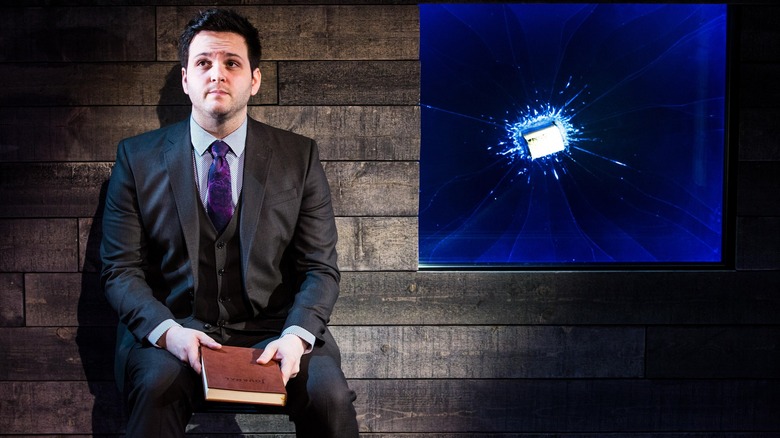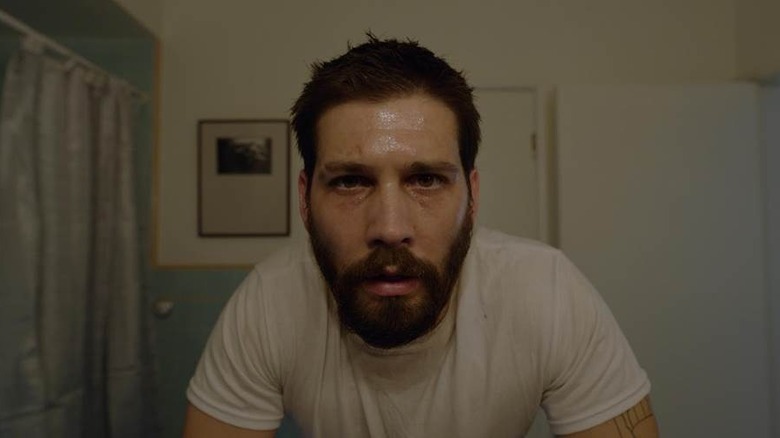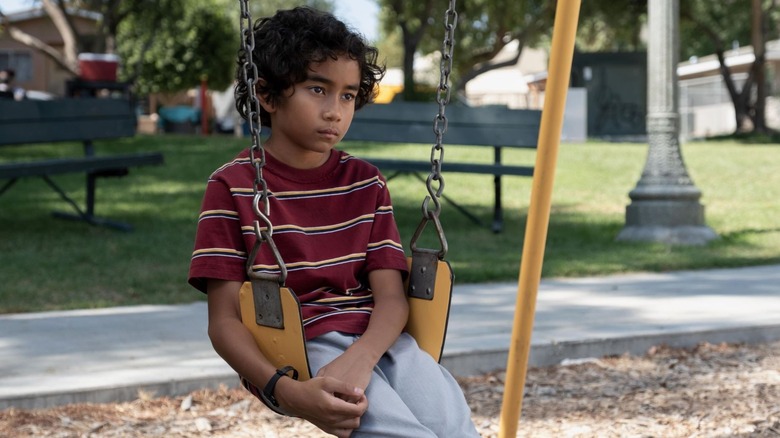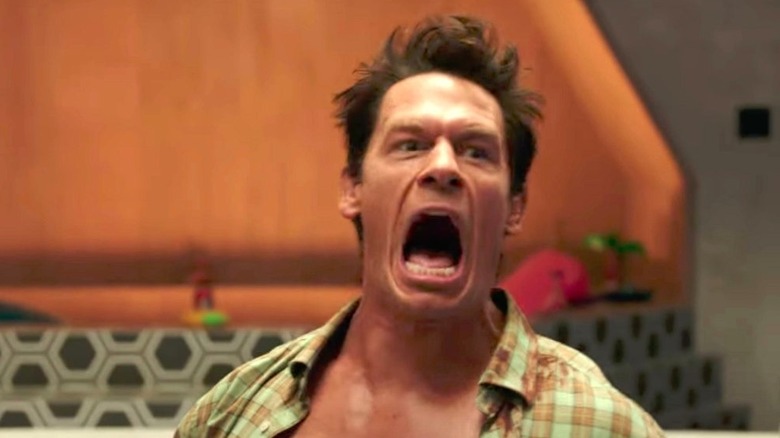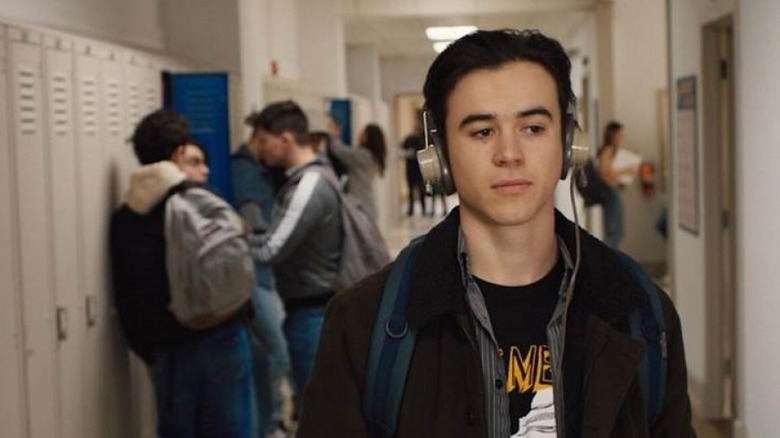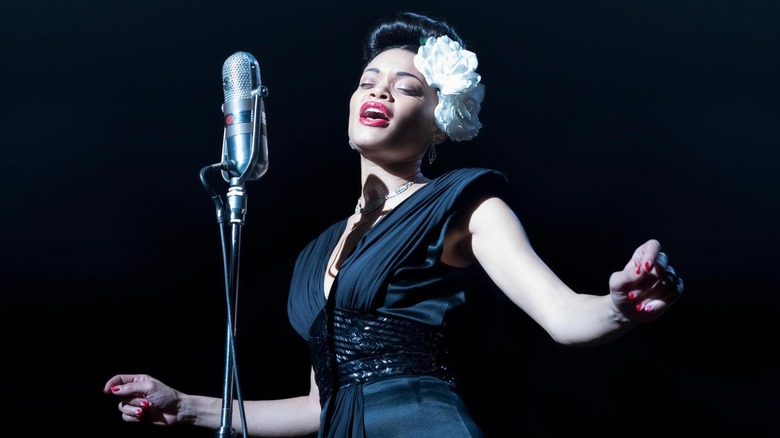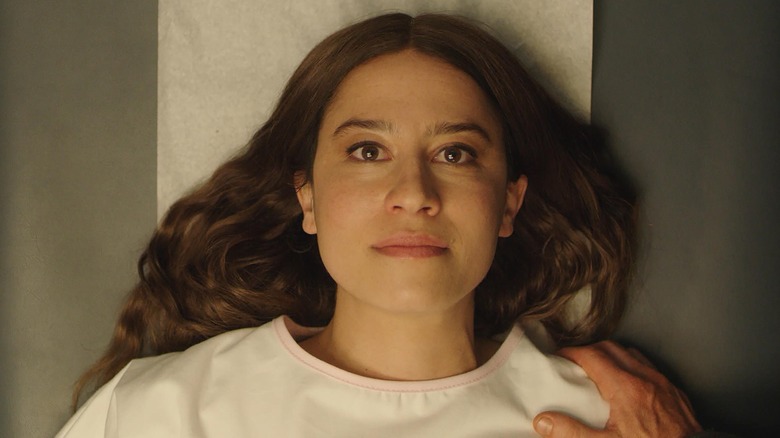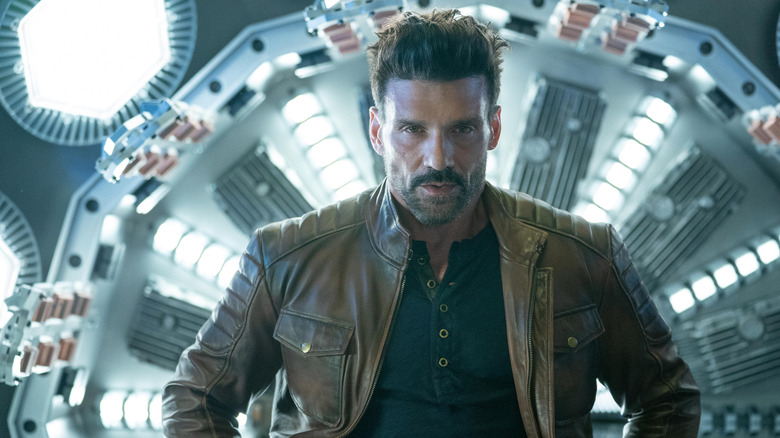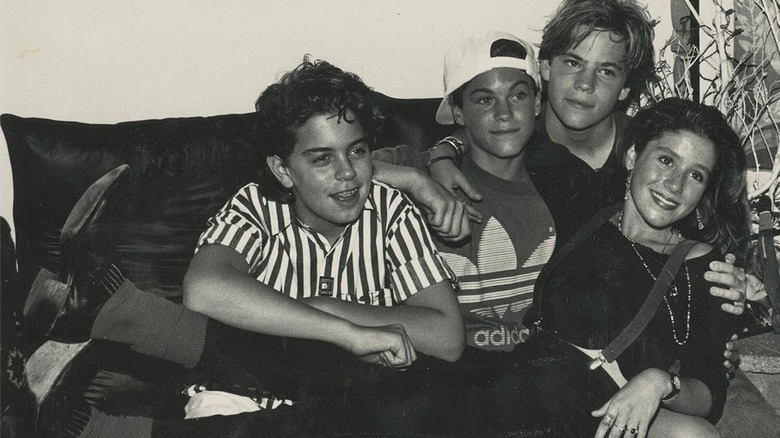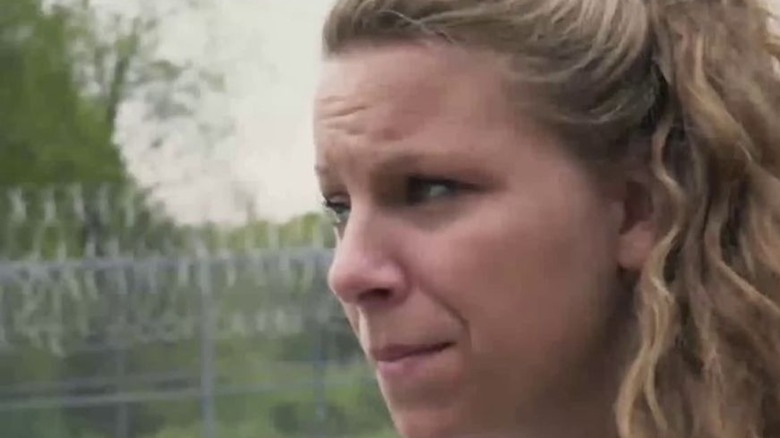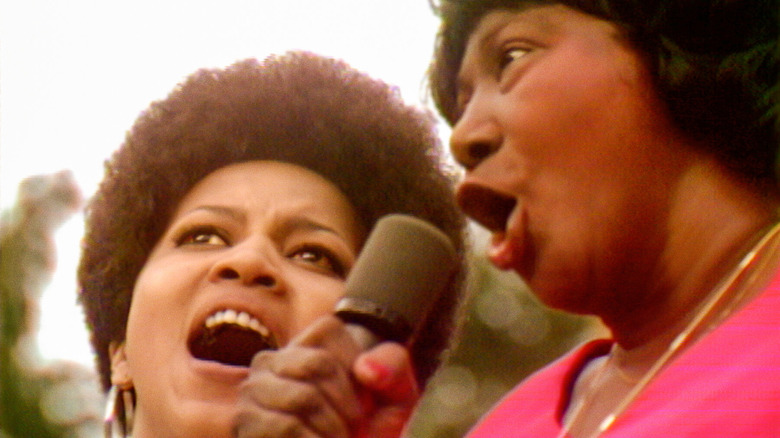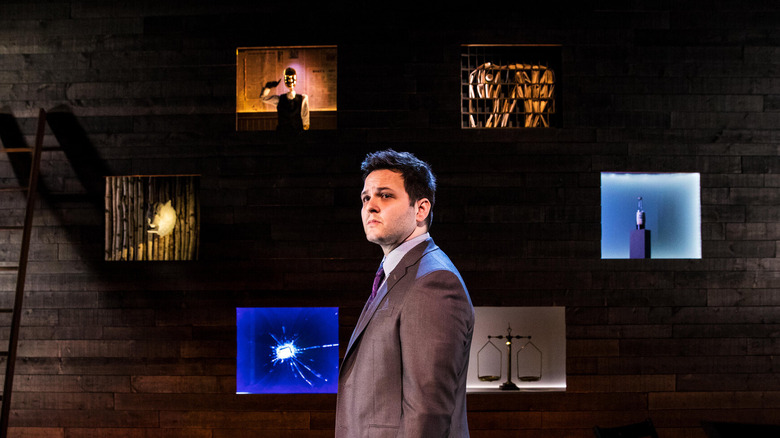The 12 Best Hulu Original Movies Of The Year, Ranked
Last year, three months into life in lockdown, Hulu released the perfect lockdown movie. Max Barbakow's "Palm Springs" was more than pleasing cinema — it was the film of its moment, albeit a moment that no one could've or wanted to imagine. A comforting comedy that doubled as a funhouse mirror for the frightening doldrums of pandemic life, "Palm Springs" was a smash, and one that cemented Hulu as an original content force with guts and money to spare. The sky, not COVID, was the limit.
Here's a thing about the sky, though: In 2021, it always felt close to falling. This was true for the film industry, where uncertainty became the new normal, as well as for most of us, who were stuck in a seemingly endless pandemic. So it makes sense that, one month away from 2022, Hulu's track record as a film-producing studio is as chaotic as the fallout from 2020 was, no sharper than the lightning in a bottle it captured through "Palm Springs" last July.
But even if Hulu Originals' slate was sort of a mess in 2021, that mess was not without its redeeming moments. The docket of projects Hulu released from January to December reached for greatness across a range of genres, often achieving electric highs. Were they perfect? No. Thrilling? Absolutely. Here, then, are the 12 best messy and thrilling Hulu Original movies of 2021, ranked.
12) Into The Dark: Tentacles
I want the "Into The Dark" movies to work more often than they do. It pains me to write that sentence, because an anthology series that provides creative freedom, capital, and exposure to indie horror filmmakers is all I want in the world.
And while "Into The Dark" has produced great films over the last few years (Gigi Saul Guerrero's "Culture Shock," for instance, is as socially critical as early Romero and as scary as Nacho Vigalondo's "Pooka" films are iconically batty and comical), this year's offerings don't quite reach those same heights.
Take "Tentacles," the conceptually rich entry from director Clara Aranovich. For most of its first hour, the film is rich with psychosexual dread. It's not clear where the horror will come from, beyond the encroaching sense that the lovestruck protagonists are toxically connected. And, honestly, that's enough! Aranovich is well-attuned to the ways human minds sprint laps to make the impulses of hearts make sense. Turning that into a genre exercise turns out to be a well-founded idea right up until the moment it's not. After a strong start, "Tentacles" descends into unintelligible CGI and jump scares that betray its crafted mood.
11) Into The Dark: Blood Moon
On paper, "Into The Dark: Blood Moon" would seem to be a slam dunk. It's the latest from Emma Tammi, who not only helmed the excellent horror-western "The Wind," but also gave us "Into The Dark: Delivered," a Mother's Day-set chiller that is one of the series' best efforts. That success, however, only seems to have set her up for comparative failure.
Tammi expands the emotional palate of both "Into The Dark" and her own filmography with "Blood Moon," delivering a supernaturally-tinged drama about Esme (Megalyn Echikunwoke) and her moon-weary son, Luna (Yonas Kibreab). It's a story that dips its toe into the horror genre's waters without working up the nerve to dive right into them.
That's a noble aim, to be sure, but Tammi's film fails to place higher on this list because it ultimately misses both its target and the ones closest to it. There's a version of "Blood Moon" that achieves cinematic weight through brevity; there's probably another that becomes a full-throated lycanthrope picture (that's the one I want to see). Unfortunately, "Blood Moon" plays like a two-part pilot, offering up ideas that crackle and simmer under a lethargically-paced and bloated plot. "Into The Dark" has its place, but if "Tentacles" and "Blood Moon" are any indication, there's still room for improvement in 2022.
10) Vacation Friends
John Cena is not compelling when he's a titan of muscle. Despite being built like an adamantium brick, the former WWE mainstay is at his most interesting when he's one of the weaker people in the room. "F9" hinged on this notion. So did the elastic comedy "Blockers." Even John Cena's recent return to wrestling (against Bray Wyatt's The Fiend) was built around Cena's mind unraveling when faced with confronting his flaws. Cena's strength is his fragility.
And so, I'm thrilled to report that Cena's turn as Ron — a wild card of a human chaotic enough to give Charlie Kelly pause — finds the actor compensating for a lot. Ron's attempts to make quick friends with Marcus and Emily (Lil Rel Howery, Yvonne Orji), another couple on vacation in most scenic Mexico, are clearly compensation for his loneliness. The frequent insanity he and his partner Kyla (a scene-stealing Meredith Hagner) incite at Marcus and Emily's wedding months later is compensation for insecurity. If you're going to slot Cena into an '80s-indebted sophomoric comedy, this is the way.
To be fair, Clay Tarver's movie doesn't have quite the breadth of gags to sustain the manic energy of his very game four leads. It dives into the deep end of gross-out humor and threatens to drown therein, often treading water whenever it isn't struggling. Compared to "Palm Springs," "Vacation Friends" suffers mightily. As a jewel in Cena's cinematic crown, however, it shines just brightly enough to belong on this list.
9) The Ultimate Playlist of Noise
Speaking of John Cena, let's define what a "mark" is. In the world of professional wrestling, a "mark" is a person who loses sight of the fact that wrestling's staged while they watch it. They don't fervently believe it's real so much as they get so swept up in the parade of promos, pinfalls, and superkicks that the question of "reality" leaves their mind entirely. A mark gets played.
I mention all of this because I, a film writer, am an absolute mark for "The Ultimate Playlist of Noise." I'm a cancer survivor. I'm a guy who grew up making mixtapes on the daily. Show me a movie about a high school senior (Keenan Johnson) who learns he has to undergo brain surgery that could render him deaf and chooses to fight against his destiny by making a playlist, my critical faculties do a heel turn and quickly vanish. "The Ultimate Playlist of Noise" has its flaws. It has many, many flaws. But its story, however obviously manipulative and calibrated to play heartstrings like an e-bow, just works.
In some ways, this is the exact kind of movie Hulu should be cranking out with regularity — one that would underwhelm in a movie theater but work in a living room, a second screen treat until the moment it grabs your attention like a long-forgotten guitar riff. It doesn't hurt that Johnson and the always incredible Madeline Brewer give it their all throughout, either. Find out if you're a mark for this one, too.
8) The United States Vs. Billie Holliday
Pop music wouldn't exist without Billie Holliday. Her singular interpolations opened the door for decades' worth of idiosyncratic performers, from Nina Simone to Whitney Houston. But her vocal riffs and stellar instrumentations were also weapons for change, ones which dragged our country's sordid history of violence against slaves back into the light on "Strange Fruit." There should be a movie about Billie Holliday, and ideally, it should be a great one.
The good news about "The United States Versus Billie Holliday" is that everything you've heard about Andrea Day's performance holds water. It's lucid, transformative work that's simultaneously three-dimensional and mythic. It isn't the responsibility of an actor to play a real person both as they likely were and as we, the audience, imagine them, but somehow Day takes that task on and makes it look as easy as breathing. She's remarkable.
The movie itself is a slightly different story. Director Lee Daniels ("Precious", "The Paperboy") has never lacked for ambition, but his decision to tell the story of "Lady Day" in hurried scenes that almost trip over themselves in their rush to become as kaleidoscopic as the singer's music is a questionable one, a creative call that may have been made to cover up for an underwritten script. It's ironic that Day's singular spin on Holliday, much like Holliday's take on standards, is what makes "The United States Versus Billie Holliday" so notable in the end. The movie practically wouldn't exist without her.
7) False Positive
The largest complaint one could lodge against "False Positive" is its lack of subtlety; to say the film uses a Donkey Kong-sized hammer when a hand would do is putting it mildly. From its opening, blood-soaked shots of Lucy (Illana Glazer) in a sullied hospital gown to Yair Elazar Glotman and Lucy Ralton's deliberately queasy score, John Lee's movie all but underlines the horror of how terrifying it is to place a woman's future in the hands of men.
To be clear, though: that is objectively terrifying, and the war being waged against women in this country even as I write this is anything but understated. "False Positive" is in conversation with the dread that's become a daily undercurrent for so many. In this way, it succeeds. As a horror film, though? It's a mixed bag.
As "False Positive" grows increasingly menacing and its excellent Dig Inn jokes fade into the background, it becomes less of an effective horror movie and more of a fine genre pastiche. That's a territory previous A24 releases have occupied ("Slice" comes to mind), but it's unclear whether "False Positive" means to settle into that same territory. That said, the film is never less than haunting, and confirms that the tonal elasticity Glazer displayed on "Broad City" isn't limited to sketch-centric comedy. Something doesn't need to be subtle in order to linger in the mind of audiences, and "False Positive" more than proves it.
6) Boss Level
A handful of directors dropped multiple films this year, including Edgar Wright, Doug Liman, and press tour champion Ridley Scott. But the double feature that surprised me the most came courtesy of director Joe Carnahan, who released not one but two crude, sweet spot-smacking action pictures. "Boss Level" is the weaker of the two, admittedly, but it's still a brightly shot, explosion-packed time-loop film that doubles as a treatise on video game cinema while yielding myriad pleasures (not the least of which is Mel Gibson getting sucker-punched).
The concept of "Boss Level" is simple: What if "Groundhog Day" had fight scenes? It follows Roy Pulver (Frank Grillo), a retired Delta Force soldier who winds up living the same day over and over again, one which finds a horde of assassins on his tail. The why involves as much technology and silly mythos as you'd expect, but the detours into existentialist angst are more in line with Carnahan's "The Grey" than "Smoking Aces."
In fact, the best thing about "Boss Level" is how much its sum total feels like Carnahan's entire filmography in one vicious package: It has the eclectic oddballs of "Aces" and the excellent needle drops of "The A-Team." Sure, its action set pieces never strike the highs of, say, "Narc" or the previously-mentioned "Copshop," but let me again remind you that it does feature Mel Gibson getting punched in the face.
5) kid90
In 2021, Hulu's non-fiction offerings were head and shoulders above (most) of their features, beginning with Soleil Moon Frye's deliberately juvenile "kid90." Comprised from hundreds of hours of footage Frye shot across nearly three decades, the film chronicles the director's life as a child starlet in the 1990s (she was "Punky Brewster"), which means appearances from Leo DiCaprio, David Arquette, Stephen Dorff, and countless others who loom in the corners of 30-somethings' memories. It also means the film is half diary, half documentary and the former grants the film an almost transgressive intimacy. "kid90" is built from the sort of photos and clips that tabloids and TMZs repurpose, and seeing them laid bare creates a confrontation with all the ways we've digested them up until now, even unknowingly.
This allows the film's documentary half to serve as a sort of cautionary tale, one removed from the ribaldries of E!'s "True Hollywood Stories." Frye is interested in the intersection between the pop-culture tornado she chronicled and the self-destruction which followed for her and so many others involved ("SeaQuest DSV" star Jonathan Brandis plays an appropriately tragic role here). That "kid90" arrives at no easy answers is simultaneously the most frustrating and moving part of the film, because I — not a child star sucked into a world bigger and richer than myself — don't always have answers for my own life. I don't expect Frye to have them, either; I expect only that she be honest, and "kid90" is nothing if not that.
4) Plan B
In her epic and heart-shredding memoir "In The Dream House," Carmen Maria Machado offers a knockout blow to anyone who rejects diverse representation in storytelling: "[Minorities]...do not deserve representation, protection, and rights because they are morally pure or upright as a people. They deserve those things because they are human beings and that is enough."
Machado is writing about queer villainy in the excerpt above, but no queer villains appear in Natalie Morales' exceptional comedy "Plan B." Queer characters do, however, as do women of Indian and Hispanic descent — and they are given full license to act as raunchy, make just as many screwups, and be as hilariously ribald as their cis male counterparts have for decades. It would be easy to assume that "Plan B," which follows two teens' road trip to acquire a morning-after pill, is fresh because it features diverse representation. It is more accurate to realize that "Plan B" isn't so fresh as it is vital, a story bursting to be told by a cast and creatives who haven't been given the chance to have their say yet.
And do they ever: "Plan B" belongs on any Best Comedies of 2021 list as it delivers memorable line after line after character and moment (you'll never look at piercings the same way again). It also delivers progress. Gloriously, the two aren't mutually exclusive.
3) Jacinta
During the worst of last year's lockdown, I found myself flinching every time I saw someone describe lockdown as "being like prison." We were not trapped inside our homes. We were volunteering confinement. The choice to remain inside, mask up, or distort our everyday lives in the hopes of quelling COVID-19 had as much to do with saving others we could not see as ourselves. We locked down so we could break free.
Jacinta, the titular character of Hulu's recent but already classic documentary, and her mother Rosemary are caught in prisons of their own making. Set over three years inside and out of Maine's Correctional Centers, the movie follows two women a generation apart yet bonded by blood, addiction, and a battle against their shared history. If that sounds difficult to watch, then good — I've described it accurately. A portrait of inherited trauma that scathingly indicts classism amidst the opioid crisis shouldn't be breezy viewing, and (as realized by director Jessica Earnshaw) it's not.
What "Jacinta" is, ultimately, rests in the heart of the viewer. Have they shown endless patience in the face of a loved one's struggle? This film will smack them sideways. Is lockdown the worst thing to ever happen to them? That will strike them all too differently. The shared experience is that "Jacinda" is an artful, devastating body blow that puts faces, names, and hearts to a crisis too often overlooked. It is a clarion call to our humanity.
1) Summer of Soul (tie)
There's no misprint: the top two films on this list are tied for first, in a dead heat for the year's best Hulu release. In many ways, they're inextricable from each other.
First up is "Summer of Soul (...or, When the Revolution Could Not Be Televised)," the Sundance smash that Hulu snatched up and released this July. A spiritual yet more urgent successor to "The Last Waltz" and "Woodstock," Amir "Questlove" Thompson's film presents the 1969 Harlem Cultural Festival in archival concert form. But "archival" feels like an understatement. The restored footage is as bracing and immediate as anything in Peter Jackson's "Get Back," but in this case "Summer Of Soul" breathes life into a musical experience mainstream America just wasn't ready to digest at the time. It is, simply put, as much fun as a movie's been this year. Every performance is a Molotov cocktail of artistic skill, righteous anger, and glorious song, and the frequency with which the film dispatches them creates a fire even injustice cannot quell.
Most movies become cinematic history — "Summer Of Soul" already is, and it makes history gloriously present.
1) Derek DelGaudio's In And Of Itself (tie)
Derek DelGaudio is interested in an artist's relationship to themselves. Are artists, like humans, doomed to a certain fate? Must they live out one story and one story alone? And if that's the case, can magic exist in the world?
It's heady stuff, and as captured by director Frank Oz, "In And Of Itself" makes existentialism both weighty and fizzy. Ostensibly, the movie is, like "Summer of Soul," a concert film. But what it truly captures is DelGaudio in concert with his audience, conducting the symphony of their emotions across ninety-plus performances and creating connections between disparate people that feel guaranteed to last a lifetime.
To say more would spoil the many surprises "In And Of Itself" tosses out like miraculous flashbangs, but I'll offer that no film on this list (or any film released this year) made me more cognizant of how precious human communication is or can be. In that sense, "In And Of Itself" is this year's "Palm Springs" — a movie that sings our current moment and the body electric while cementing Hulu as a producing force for years to come. It's a relationship I'm happy to be in.
